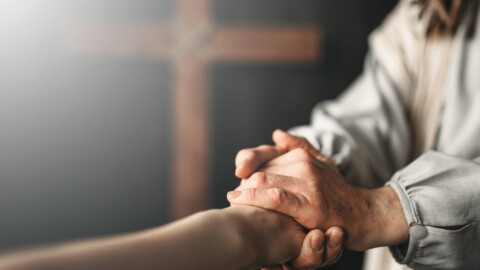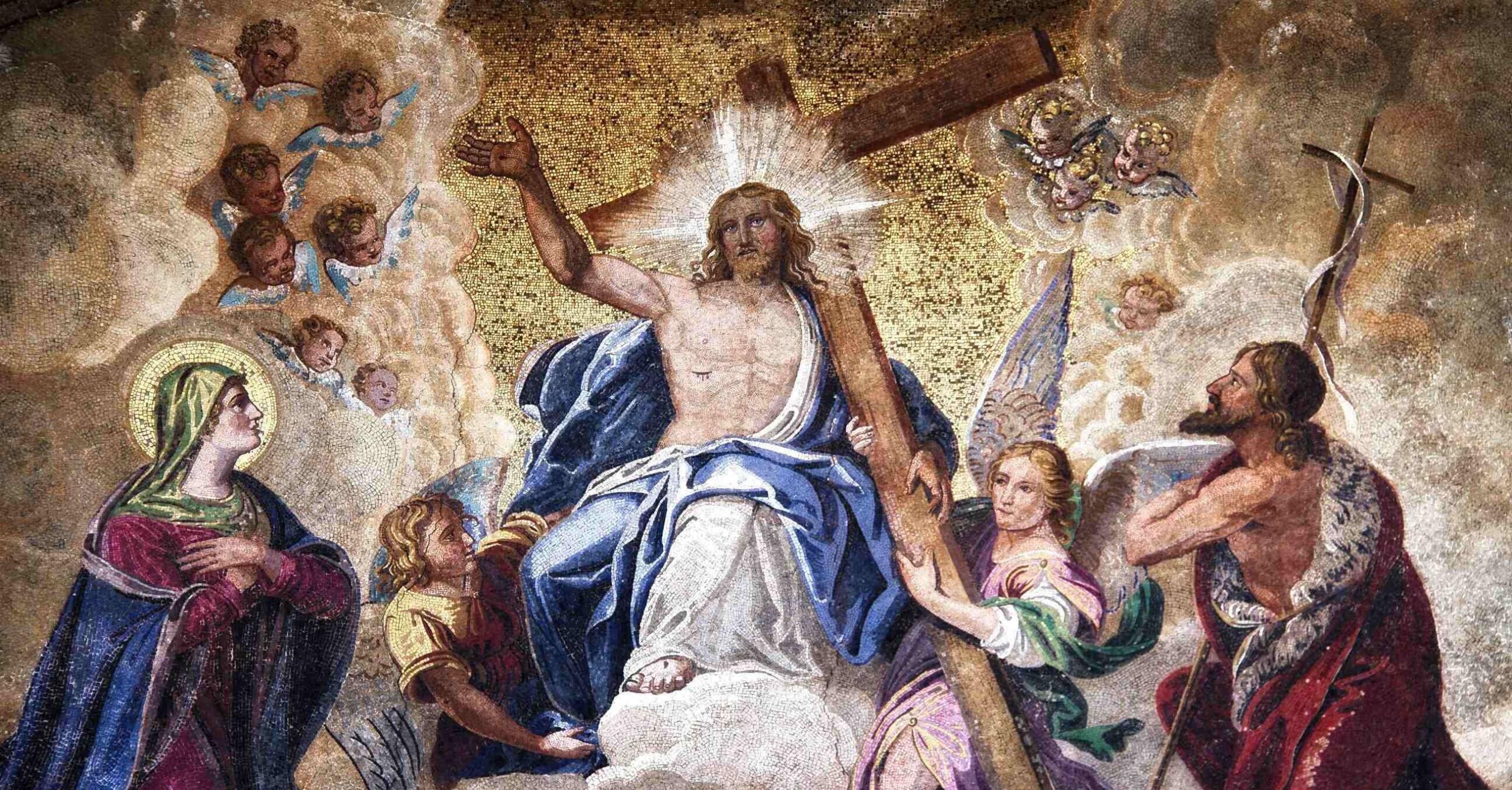Proper 17, Sunday 28 August 2022

Many of us came to Europe seeking a better life, and found God – may we share this with others around us. Truly in our hearts it is God we are seeking, and this is inherent in humans. But where do we find and encounter Him?
What are meals for?
Today’s Gospel is about having a meal. Gathering around a table has been from time immemorial, and always will be, a daily human activity. Workers eat throughout the day, business people use meals to close deals with clients, and there are restaurants everywhere. Wherever you go, people love to eat. Eating may satisfy our physical hunger and fuel the body, but a meal is where friends interact, and where family bonds are made strong. There’s something sacramental, spiritual, and metaphysical about it. Gathering around the table is recorded in the Bible; Jews have the Passover Seder, and the Church family gathers together every Sunday around the Table, where her members receive life provided by the Father. Matthew and Luke include parables in which someone prepared a wedding feast and invited guests, and was upset when some ignored his call.
I learned one of the lessons first-hand. As a young man I participated in missions, and someone provided cars for our travel. On one occasion there was a new car. I chose a comfortable seat, but was asked to move because the owner would take it. It’s wiser to wait for everyone to be seated, and never make an assumption that this is your place.
Jesus was surrounded by Israel’s religious community, and took the opportunity to teach more than proper etiquette. The religious leaders had forgotten the significance of coming together: they saw it as an opportunity to parade what they were wearing, and hoped for attention. Jesus corrected them for showing off their wealth and position and seeking the best places.
Help those who cannot repay you
He prescribed a cure: When you eat together, don’t invite those whom you know and who can invite you in return (I will invite you; next week you invite me), but those who cannot. I give a tip to a taxi driver because he will not be able to pay me back: I may never see him again. Jesus said we should be generous to those who cannot repay us; that is where we will receive true blessings:
“Invite the poor, the crippled, the lame, and the blind. And… you will be repaid at the resurrection of the righteous.”[1]
The poor are those who don’t have anything to eat, the ability to clothe themselves, or a roof to cover them. You are not poor if you have clothing, food, and shelter. If you compare yourself with rich people, you might think you’re poor, but in God’s eyes you are not, even if you’re broke. Especially if God is on your side, you’re not poor – stop thinking you are. If the rich young ruler sold his possessions and gave to the poor, he had Christ; Christ is greater than possessions, and the Giver of eternal life. Possessions are only for this life; but if we have God, we have riches that many don’t. Sometimes the question is not where you are running to, but what you’re running from.
James echoes the Lord’s words:
“Pure and undefiled religion before God and the Father is this: to visit orphans and widows in their trouble, and to keep oneself unspotted from the world.”[2]
Saint Bede said,
“It is good to see that James has added the words ‘before God the Father’, because there are plenty of people who appear to be religious in the sight of men, but who are wicked as far as God is concerned.”
Some Christians look religious when they come to a religious activity, but they have forgotten some of the things God has asked them to do, and are wicked in God’s eyes.
It is not only by the Epistle of James that we are reminded constantly to care for people who are less fortunate than we are.
I remember the spirit of unity and co-operation in the Philippines, which we inherited from our ancestors: When one person had a need, everyone came to help, and you would feel bad if you didn’t. Should we forget this because we are in Europe? No culture is perfect, but if Western culture has positive aspects, so does Filipino culture. You help me this week; I’ll help you next week. We survive because we’re a community. That’s our how church and our community will be strong, and how our children and grandchildren will be strong: if we always keep together, meet together, and help together.
Why is it so difficult to set our eyes on poor people? Why has society become so indifferent? I’m not perfect, but I’ve learned when someone comes to me with a need, always to ask the Lord, “Why did You bring this person to me? What do You want me to do?” When someone comes to you with a need, it’s because God wants you to represent Him: we are His hands and feet. God wants you to be a channel of His blessing; the blessings He has poured upon us are not only for ourselves, but to share with others. Why is it so difficult in to reach out to others? We see someone begging, and say, “I also have needs”; but it is an opportunity to plant a seed and for God to minister to your needs.
Finding God in our own poverty
Henri Nouwen says that poverty might not only be a lack of money, but a lack of emotional stability, a loving partner, security, safety, or self-confidence.
“Each human being has a place of poverty”
– and God wants to dwell in your poverty. When Jesus said,
“How blessed are the poor”,
He meant that our blessing is hidden in our poverty: God reaches out to you in your poverty. This does not mean we have to be materially poor; but we need to acknowledge and understand that each one of us has our own poverty, and that in your poverty is where God meets you. We are inclined to cover up our poverty and ignore it, so we miss the opportunity to discover God dwelling in it. God comes to the rescue and is closer to us when we need Him most. Sometimes it feels as if He is absent; but Nouwen says,
“Let us dare to see our poverty as the land in which our treasure is hidden.”
“For you know the grace of our Lord Jesus Christ, that though He was rich, yet for your sakes He became poor, that you through His poverty might become rich.”[3]
It’s not accidental that the Lord’s Table and gathering around a meal are mentioned together with the poor. We go to church because we need God and want to hear what He has to say – His words are life. Many of us are seeking our life’s direction, and we find meaning and purpose.
Money cannot give you happiness, neither can the world. There’s no happiness in this world without God. Look how many celebrities kill themselves; they have more money than they need, but some are not happy. But there are some poor people in the Philippines who are happier than some of us, even though their lives are simple. It’s not wrong to desire a better life, but we need to be thankful for where God has placed us.
Blaise Pascal said,
“If God exists, not seeking God must be the gravest error imaginable.”
We seek God because in each of us is a poverty that only He can fill; that’s why we come to His Table. We come with the attitude that, “I’m poor, almighty God, and I’m a needy person; that’s why I come to You.” We need God to illumine our hearts and minds: We think we need the world – no; what we need is God. Many Filipinos have come to Europe because they needed money, but some have found Jesus; that’s the greatest blessing. We come before the Table of the Lord acknowledging our own poverty, because if we know our poverty, we’ll be able to reach out to the poor around us.
If humans are searching for God, where do we find Him? We encounter Jesus in the Eucharist. He comes to us: He became poor that we might become rich in Him. We also find Jesus in the poor; that’s why He said we should never forget them.
“Find your Calcutta”
Mother Teresa championed caring for the poorest of Calcutta; she held in her hands some of the filthiest street people and took care of them. She is someone to emulate and follow. She awakened in us the cure to indifference in the society we live in. She said that “Calcuttas” are everywhere if you simply open your eyes. You don’t literally have to go to Calcutta to do something – in every city there is a Calcutta. In every city there are people who are hungry and seeking for God. If you open your eyes, you will find a Calcutta in the city where you live. She said,
“Find your Calcutta.”
In the world, we are taught indifference, and the survival of the fittest: before everyone else, it should be me. That’s the opposite of today’s Gospel. Don’t think too much of yourself – take care of others, and let God take care of you.
Who are the poor? Do we have a Calcutta in our city? Are there people who are living in Calcuttas in their hearts? The answer is yes. Offer your life to God today:
Lord, I offer myself to be a channel of Your blessings, because I realise that in my own poverty You came to make me rich.
Nouwen says that unless we understand our own poverty, we will never reach out to the poor. But once we understand that we come before the Table of the Lord because we are needy and have our own poverty, and God reaches out to us in our poverty, our lives will be transformed and we will be able to reach out to our own Calcutta. We come in our poverty, and leave a different person, because in our poverty the Lord gave His life for us.
Lord, we have misunderstood coming to the Table: that You invite us to a feast, to be joined to You. You offer us Your life where there is death, joy where we are sorrowful, Your help and courage when we are discouraged. As Your creation we are frail and in poverty, and we come to You today.
Forgive us, Lord, for our selfishness and indifference to those around us who are in need, for always thinking about ourselves and our families and enjoyment of life. Help us to realise that even the sufferings we go through are a blessing from You. You said to deny ourselves is the first step to following You; we cannot find fulfilment in ourselves, but only in You. Make us conduits and channels to help others who are in poverty in our city – not only for food, but for spiritual things: Your love, peace, and joy. Help us to be the instrument You are calling us to be.
God takes care of us
We have been mostly looking after ourselves, and thinking too much of ourselves. If you learn how to take care of others, God will take care of you and your family. A priest told me he had given his life to the Lord, and asked me to ensure he wouldn’t be hungry. I cannot assure him of that, but I can assure him that God will never let him be hungry; He is the best employer in the world.
“I have never seen the righteous hunger”.[4]
God said to Abraham,
“I will… be your God”.[5]
When I reflect on these words, I think of YHWH Jireh,[6] YHWH Rapha,[7] YHWH Tsidkenu,[8] and all His characteristics. He is offering everything He has: “I will take care of you for the rest of your life, and even bring you to eternity.” That is our God. You will regret trusting yourself and the world, but you’ll never regret trusting Him.
Say to the Lord, “I want to be a channel of Your blessing.” Consider our lives today: God has taken care of us, and He will continue to do so. But God’s blessing isn’t only for you – He wants you to take care of someone else.
Humility in giving (by Fr. Joel Valdez)
Proper etiquette also applies to giving:
“For everyone who exalts himself will be humbled, and he who humbles himself will be exalted.”[9]
In tithing and giving offerings, we humble ourselves before God by acknowledging Him. It’s said that humility is the best policy. If we apply this to giving, our humility shows that we need God. If you humble yourself, even in sickness and pain, God will take care of you, and He will exalt you, whatever your situation in life, because He is a good God.
Study questions:
- Do you hurry to choose the best place, or give way to others? In what other situations do you particularly need to apply this principle?
- Do you usually participate in helping when there is a need in your family, church, or local community, or do you regard it as someone else’s responsibility? How could you, your family, ministry group, and church, grow in this?
- What is your place (or what are your places) of poverty, and have you found God there? What could help you to do so?
- Where or what is your “Calcutta”, and that of your family and your church? Have you offered yourself to God to serve there? What is the next step He is calling you take?
- Are you humble or proud in relation to giving (financial or otherwise)? Are you trusting God to take care of your needs?
[1] Luke 14:13-14, NRSV
[2] James 1:27, NKJV
[3] II Corinthians 8:9, NKJV
[4] Psalm 37:25 [condensed]
[5] Genesis 17:7
[6] The LORD who provides; literally, “the LORD who sees” (Genesis 22:14)
[7] The LORD who heals (Exodus 15:26)
[8] The LORD our righteousness (Jeremiah 23:6)
[9] Luke 14:11, NASB









